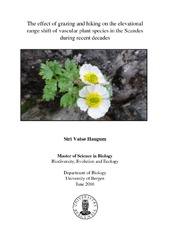The effect of grazing and hiking on the elevational range shift of vascular plant species in the Scandes during recent decades
Master thesis
Permanent lenke
https://hdl.handle.net/1956/15830Utgivelsesdato
2016-06-01Metadata
Vis full innførselSamlinger
Sammendrag
Resurvey of historical plant distribution data can provide valuable information about how plant communities have changed, a topic which is of great interest due to recent decades of climate and land use change. Range shifts towards higher elevations have been observed for alpine vegetation in mountainous areas all over the world during the recent decades. A correlation in time between the observed range shift and climatic changes has led to an expectation of climate as the driving factor, while other factors and their interactions with climate have received less attention. One factor which might affect species distribution, both directly and in interaction with climate, is dynamics in the species communities induced by two key factors of disturbance: large herbivores and hikers. Intensity of these factors has changed dramatically over the past century. I investigated the effect of large herbivore grazing and hiking on upward plant species range shift and dynamics in the summit flora species composition, through a resurvey study in three areas along the south-north axis of the Scandes. I demonstrate a buffering effect on the upward range shift from grazing by semi- domestic reindeer and sheep. All mountains have had a turnover in the species composition in the upper elevation range, but there was no detectable difference between mountains exposed to grazing and/or hiking and not. Hiking was not found to affect the upward range shift either. The results from this thesis show that land use, specially grazing, is affecting the observed range shift. Grazers have effects on range shifts through a variety of mechanisms which are undistinguishable in this form of resurvey and should be the focused of experimental work in the future.
